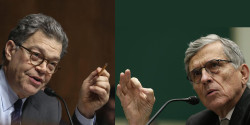Minnesota Senator Al Franken is one of the stronger Congressional advocates of network neutrality. He is also a firm opponent of communication industry consolidation, as well as a former radio host.
On Tuesday Franken sent a strongly worded letter [PDF] to FCC Chairman Tom Wheeler about the Commission’s proposed Open Internet rules. He does not mince words, writing, “Your proposal would grant Verizon, Comcast, and other ISPs the power to pick winners and losers on the Internet, which violates core net neutrality principles that you have publicly supported in the past.”
Addressing the “commercially reasonable” standard that Wheeler proposes for assessing whether or not a pay-for-play deal violates open internet rules, Franken says this “misses the point: Pay-to-play arrangements are inherently discriminatory and anticompetitive, and therefore should be prohibited as a matter of public policy.”
Franken joins fellow Senators Bernie Sanders, Ed Markey, Kristen Gillibrand, Cory Booker, Ron Wyden, Richard Blumenthal and Jeff Merkley who have all publicly criticized Wheeler’s Open Internet proposal,and the internet “fast lane” it would create.
For his part Wheeler published his second blog post on the subject, also on Tuesday. He argues that for a decade there have been “no lasting results” on net neutrality, resulting in the situation where, “Today Internet Openness is being decided on an ad hoc basis by big companies.”
He insists that “something that harms consumers,” “something that harms competition,” or “providing exclusive, prioritized service to an affiliate” are all things that would not be “commercially reasonable.”
For the first time Wheeler puts the use of “Title II” on the table, “If we get to the situation where arrival of the ‘next Google’ or the ‘next Amazon’ is being delayed or deterred[.]” Title II would mean reclassifying internet service back to being common carrier, like telephone, strengthening the FCC’s ability to protect against discrimination. However, such reclassification is not part of the current Open Internet proposal.
As I mentioned before, regardless of what one might think of the actual proposal, Wheeler’s willingness to hash this out publicly is refreshing compared to past chairmen. Nevertheless, a lively public debate should not distract from the real meat of the matter, which is the proposal going in front of the Commission at its May 15 meeting.
Furthermore, while many net neutrality advocates are hoping their critiques are having some influence on the not-yet-public draft proposal, a careful and thorough public comment period must be part of the rulemaking process.
Stay tuned.



